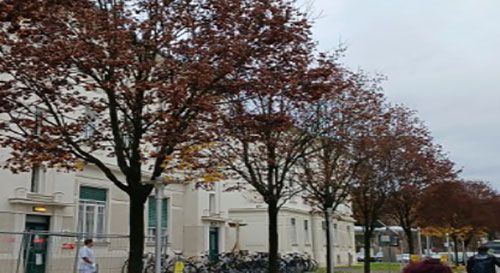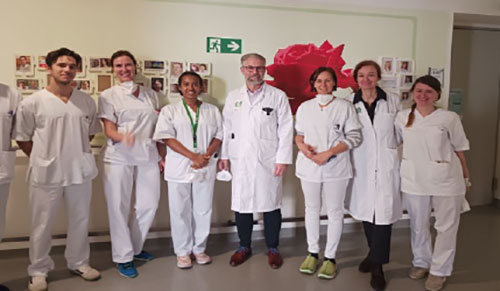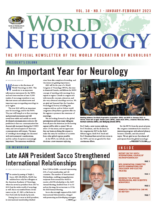By Seblewongel Asmare Seyoum

The neurology department building at Medical University of Graz.
I had the chance to participate in the department visit program of Austria 2022, which was organized in collaboration between the Austrian Neurological Society (OEGN) and the WFN. I stayed for four weeks in the beautiful and historic city of Graz, Austria. I had a lot of experiences and exposure during my stay.
On my first day, I met with a welcoming secretary of the department, Michaela Schweiger, who gave me a tour of the department and the hospital compound to familiarize me with the property as soon as possible. She also introduced me to Prof. Christian Enzinger, and we had a brief discussion about how to spend the four weeks in the department. I was assigned to the neurointensive care unit and started to work on the same day. At the unit, I met a team of specialists who are hard-working and dedicated. I joined them in every activity, including rounds, case discussions, and bedside procedures. I appreciated how the patients get quality and scientific care.

Prof. Christian Enzinger and the general neurology ward team.
In my second week, I joined the stroke unit team. I met different stroke specialists who are expert both in clinical and research activities. We did rounds and discussed each clinical case. We also discussed some published articles. The team also introduced me to the radiology department, and I was able to see some neurointerventional procedures in the operation room, such as aneurysm coiling, diagnostic digital subtraction angiography, and other procedures.
I spent the third week rotating at different outpatient clinics. I got to see many different cases and up-to-date management. I had the chance to see many new drugs being used and procedures being done routinely like EEG, NCS/EMG, and nerve ultrasound. It was the best week since I got to meet many experienced doctors and discuss each case in detail.
On my last week, I stayed in the general neurology ward, where I got to see some cases that I don’t usually see in my country. Meanwhile, the international office of the university was able to arrange a guided city tour and intercultural get-together, which allowed me to connect with many other students and doctors who come from different countries.
Overall, my stay was pleasant and overwhelming with all the new hospital setup, the culture, and the weather too. I did all to get the best out of my stay. It motivated me to take and implement all the experience I gained to my country and to pursue more in my neurology career. One of the challenges I faced was the language barrier, but the staff was so helpful to translate and discuss in English.
As a recommendation, it would be great if these observership programs were available for more neurologists and if more fellowship programs are open to supporting the physicians and the society at large.
Last but not least, I would like to thank all the staff of the department of neurology at the Medical University of Graz, the Austrian Neurological Society (OEGN), and the WFN for giving me this great opportunity. •
Seblewongel Asmare Seyoum is a a neurologist at Bahir Dar University in Ethiopia.
